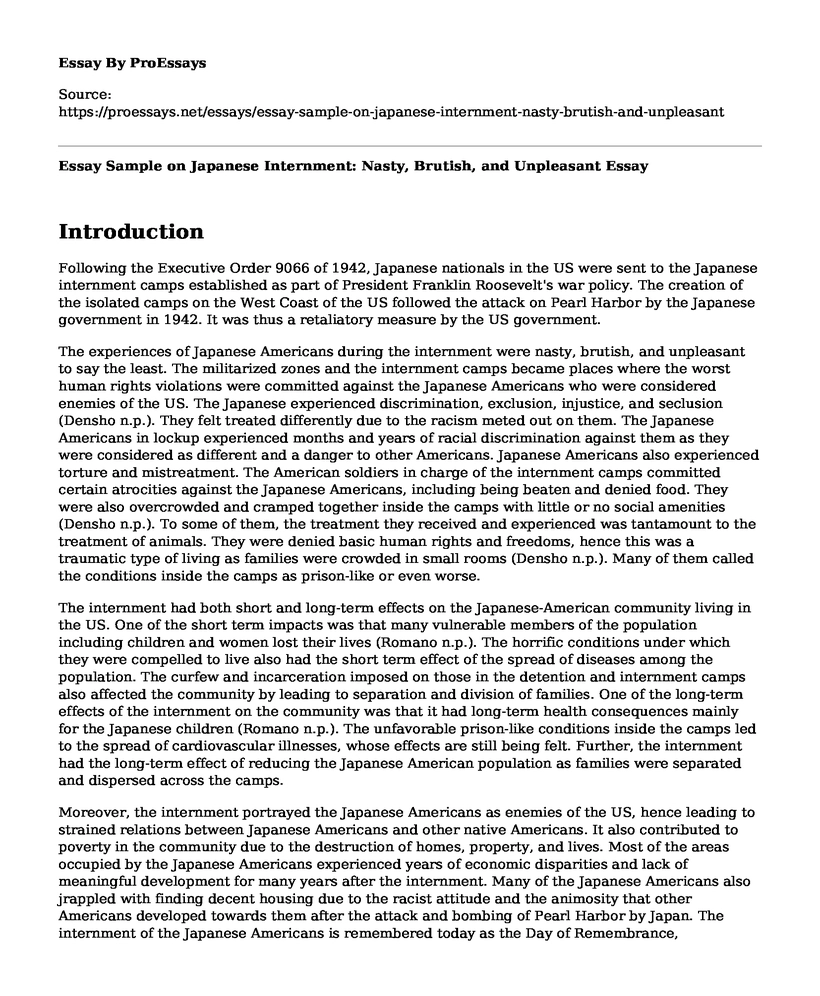Introduction
Following the Executive Order 9066 of 1942, Japanese nationals in the US were sent to the Japanese internment camps established as part of President Franklin Roosevelt's war policy. The creation of the isolated camps on the West Coast of the US followed the attack on Pearl Harbor by the Japanese government in 1942. It was thus a retaliatory measure by the US government.
The experiences of Japanese Americans during the internment were nasty, brutish, and unpleasant to say the least. The militarized zones and the internment camps became places where the worst human rights violations were committed against the Japanese Americans who were considered enemies of the US. The Japanese experienced discrimination, exclusion, injustice, and seclusion (Densho n.p.). They felt treated differently due to the racism meted out on them. The Japanese Americans in lockup experienced months and years of racial discrimination against them as they were considered as different and a danger to other Americans. Japanese Americans also experienced torture and mistreatment. The American soldiers in charge of the internment camps committed certain atrocities against the Japanese Americans, including being beaten and denied food. They were also overcrowded and cramped together inside the camps with little or no social amenities (Densho n.p.). To some of them, the treatment they received and experienced was tantamount to the treatment of animals. They were denied basic human rights and freedoms, hence this was a traumatic type of living as families were crowded in small rooms (Densho n.p.). Many of them called the conditions inside the camps as prison-like or even worse.
The internment had both short and long-term effects on the Japanese-American community living in the US. One of the short term impacts was that many vulnerable members of the population including children and women lost their lives (Romano n.p.). The horrific conditions under which they were compelled to live also had the short term effect of the spread of diseases among the population. The curfew and incarceration imposed on those in the detention and internment camps also affected the community by leading to separation and division of families. One of the long-term effects of the internment on the community was that it had long-term health consequences mainly for the Japanese children (Romano n.p.). The unfavorable prison-like conditions inside the camps led to the spread of cardiovascular illnesses, whose effects are still being felt. Further, the internment had the long-term effect of reducing the Japanese American population as families were separated and dispersed across the camps.
Moreover, the internment portrayed the Japanese Americans as enemies of the US, hence leading to strained relations between Japanese Americans and other native Americans. It also contributed to poverty in the community due to the destruction of homes, property, and lives. Most of the areas occupied by the Japanese Americans experienced years of economic disparities and lack of meaningful development for many years after the internment. Many of the Japanese Americans also jrappled with finding decent housing due to the racist attitude and the animosity that other Americans developed towards them after the attack and bombing of Pearl Harbor by Japan. The internment of the Japanese Americans is remembered today as the Day of Remembrance, particularly in the states of California, Oregon, and Washinton. This day is remembered on February 19.
Works Cited
Densho. "American Concentration Camps." YouTube, 9 Apr. 2015, https://www.youtube.com/watch?v=wyDLr8Svoio&list=PL_txUBUpMcH7c55JVOMMd-G0EIQ-mpjQ_&index=3. Accessed 4 Dec. 2019
Romano, Renee. "The Trauma of Internment." The Washington Post, 25 Jun. 2018, https://www.washingtonpost.com/news/made-by-history/wp/2018/06/25/the-trauma-of-internment/. Accessed 4 Dec. 2019
Cite this page
Essay Sample on Japanese Internment: Nasty, Brutish, and Unpleasant. (2023, Mar 12). Retrieved from https://proessays.net/essays/essay-sample-on-japanese-internment-nasty-brutish-and-unpleasant
If you are the original author of this essay and no longer wish to have it published on the ProEssays website, please click below to request its removal:
- Essay on Government Policy to Stimulate the Economy
- The Law of Interpreting the Constitution Essay Example
- Essay Sample on the Legend of the Alamo
- Essay Example on Pablo Escobar: The Most Notorious Drug Dealer in History
- Essay Example on the US: A Superpower Playing a Major Role in Global Politics
- Essay Example on Electoral Security Matters: US 2020 Elections & Beyond
- NCAA Rules: Establishing Student-Athlete Eligibility - Report Sample







